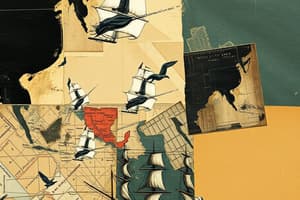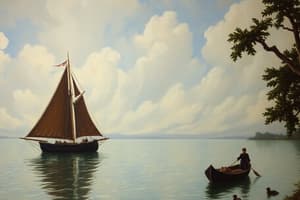Podcast
Questions and Answers
What economic principle believes that profitable national trading benefits the economy?
What economic principle believes that profitable national trading benefits the economy?
- Free trade
- Socialism
- Capitalism
- Mercantilism (correct)
Which explorer is known for conquering the Inca Empire and founding Lima?
Which explorer is known for conquering the Inca Empire and founding Lima?
- Ferdinand Magellan
- Hernán Cortés
- Francisco Pizarro (correct)
- Vasco de Gama
What term describes the agricultural products used for commercial sale instead of personal use?
What term describes the agricultural products used for commercial sale instead of personal use?
- Cash crops (correct)
- Subsistence crops
- Perennial crops
- Food crops
Which agreement defined the areas that Spain and Portugal could explore and claim?
Which agreement defined the areas that Spain and Portugal could explore and claim?
What was the primary motivation behind the phrase 'Gold, God, Glory' for European explorers?
What was the primary motivation behind the phrase 'Gold, God, Glory' for European explorers?
Flashcards are hidden until you start studying
Study Notes
Mercantilism
- Economic theory where a country's wealth is measured by its gold and silver reserves
- Countries aimed to export more goods than they imported to increase their gold and silver reserves
- Trade was heavily regulated to ensure the country's economic success
Colonization
- Francisco Pizarro: Spanish conquistador who conquered the Inca Empire, founding the city of Lima, Peru
- Vasco de Gama: Portuguese explorer who was the first to sail from Europe to India by rounding the Cape of Good Hope, opening trade routes to Asia
- Christopher Columbus: Italian explorer who sailed for Spain, landing in the Americas in 1492
- "Gold, God, Glory": Motives for European exploration and colonization
- Gold: Wealth and resources
- God: Spread of Christianity and conversion of indigenous people
- Glory: Power, prestige, and expansion of empires
Society and Culture
- Mestizos: People of mixed Spanish and Indigenous ancestry
- Peninsulares: Spaniards born in Spain who resided in the New World, holding the highest positions in colonial society
The Columbian Exchange
- A significant exchange of plants, animals, diseases, and ideas between Europe, Africa, and the Americas
- Introduced many new crops and animals to the Americas, including horses, cattle, wheat, and sugar cane
- Also introduced diseases like smallpox to the Americas, which had devastating effects on indigenous populations
Key Terms
- Viceroys: Representatives of the Spanish king in the colonies
- Tariffs: Taxes levied on imported goods
- Cash Crops: Crops cultivated for commercial sale
- Reconquista: The centuries-long effort by Christian forces to drive out Muslim rule from Spain
- Treaty of Tordesillas: Agreement between Portugal and Spain in 1494 that divided the newly discovered lands in the Americas between the two nations
- Jamestown (Colonies): The first permanent English settlement in North America, established in 1607
- Indentured Servants: People who agreed to work for a set period of time in exchange for passage to the Americas and the promise of land after their service
Studying That Suits You
Use AI to generate personalized quizzes and flashcards to suit your learning preferences.




